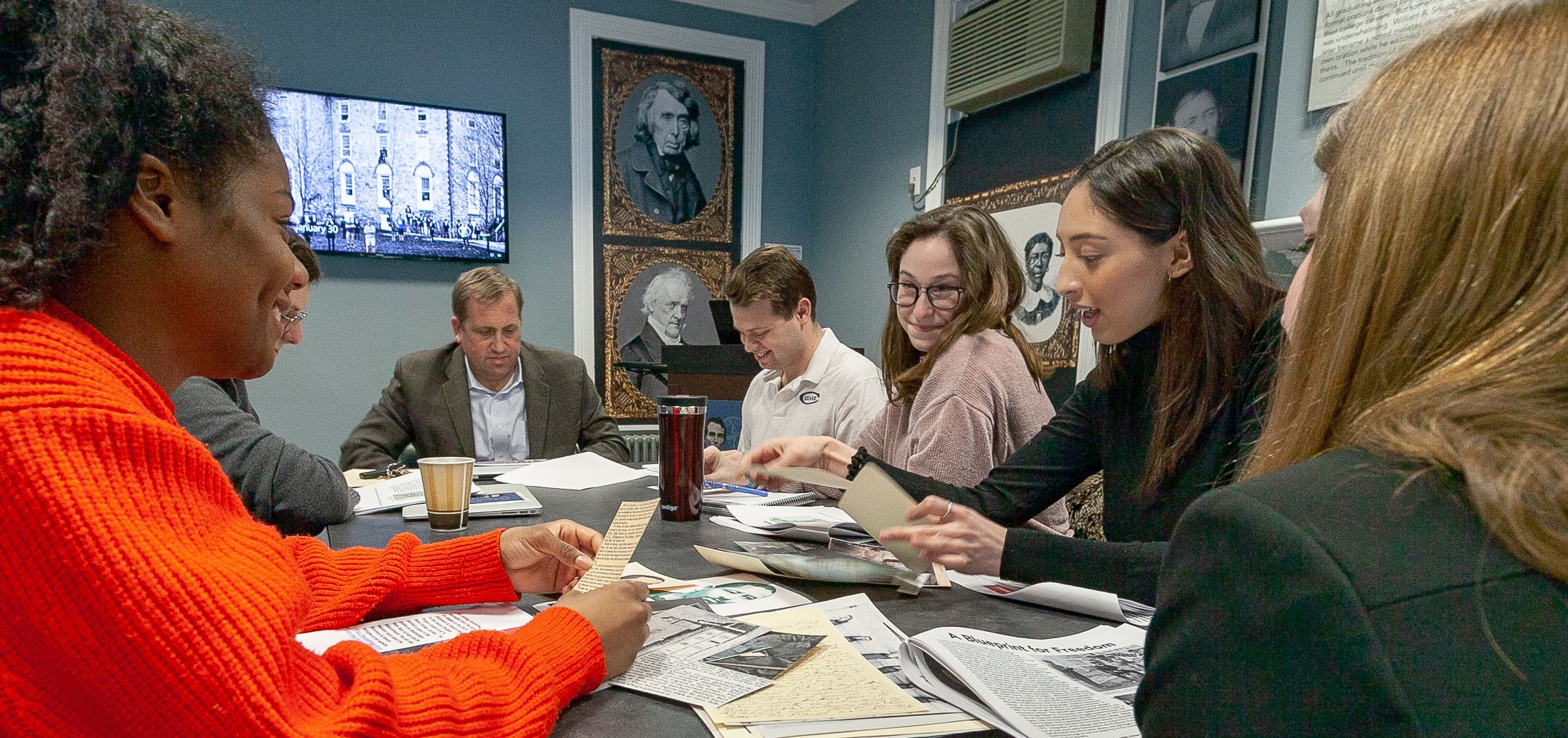Oral History Projects Make Lasting Impact

Students in Professor of History Matt Pinsker’s class explore historical records.
Two oral history projects turn into journeys for truth
by Kandace Kohr
When a school project makes you think critically about a subject, that’s learning. But when a school project forces you to examine how facts and “truth” can be manipulated and fabricated to fit a perspective, that’s Dickinson’s liberal-arts education at work. Such is the case for many Dickinsonians, including Caly McCarthy ’17 (environmental studies and history) and Dana Marecheau ’20 (policy management), whose work in Professor of History Matt Pinsker’s class took them down a rabbit hole in a quest for a truth.
For over a decade, Pinsker has been collecting outstanding student work to help inform his teaching. He has since collected these projects in what he calls the “Hall of Fame.”
“I've been relying on a student 'Hall of Fame' for years in my various classes,” he explains. “Usually each semester, I try to incorporate at least some of those Hall of Fame projects into the syllabi of my courses. I find it works really well, both in terms of conveying content and also just inspiring students to see how their work might help other people learn more. But once the pandemic hit and so many teachers and parents were looking for free video and online content to support at home learning, I wanted to make these student-built resources even more accessible.”
UNCOVERING ECHOES OF AN INNER TRUTH
As part of his American History 1877 to Present course, Pinsker assigns an oral history project, chosen organically by the students based on the stories of their interview subjects (usually family or close friends, but sometimes teachers) and an assessment relevant to the coursework. For her project, McCarthy explored her father’s ordination as sub-deacon of the Catholic Church in Washington, D.C., in 1968, just days after Martin Luther King Jr. was assassinated. She shared his experience living in D.C. during the political and civil unrest that followed.
Marecheau examined the U.S. invasion of Grenada in 1983 from the lens of a first-generation American whose family emigrated from the small Caribbean island. To learn more about the impact of the attack on Grenadians, Marecheau spoke to a family friend named Rupert, who shared firsthand accounts as a resident on the island during the onslaught. While she recorded his testimonies and those of others, she recalls some of the challenges she faced.
“I found that what I was reading in the textbooks and history books contradicted [my interview subject’s] story,” she says. “It also omitted the true oppression the native islanders were feeling at the time of the attack, and it misrepresented the people.” Pinsker is currently using Marecheau’s oral history in his U.S. Diplomatic History class.
Like McCarthy, Marecheau took a deep dive into her project, feeling personally connected to what she was researching. Each emerged with a new insight and understanding.
WITH A NEW PERSPECTIVE
Years after she wrote her oral history, McCarthy revisited her work when she found out it was chosen to be featured in Pinsker’s Hall of Fame. For the last year and a half, she’s been living in D.C., where she works as an administrative assistant for ForestGEO, a global research network coordinated by the Smithsonian.
“My awareness of how protests, riots, looting and violence get framed in expressly racial ways has become heightened since moving to D.C.,” she says, noting the recent coverage of unrest and demonstrations in the nation’s capital. “Living in a city, in a time when these news stories are unfolding in my place of residence, rather than in a book or by hearsay, [increased] my awareness, like maybe I shouldn’t just take all of this as people are saying. Maybe I need to push back a little bit on the framing.”
Looking at her oral history with this new lens, she crafted a preface, an open and honest response to the unintentional transgressions in her initial piece. “We have to own our individual mistakes, maybe especially the unintentional ones,” she explains, “because otherwise racism will always come from other people, bad people doing mean things. I’m coming to understand that racism takes many subtler but still potent forms. This is critical to recognize if we want to bring an anti-racist future to fruition.”
Marecheau also grappled with the “white-washing” of history books, but she found that it left a place for new stories to unfold. She began working as an intern with the House Divided Project, where she collaborated with other campus leaders to rename buildings on campus. She was also one of the founders of the Inaugural Women of Color Summit in 2019. Currently, Marecheau is living in Brooklyn, New York, where she’s looking to start a career in marketing and storytelling.
Click here to see more projects included in Pinsker's Hall of Fame.
TAKE THE NEXT STEPS
Published October 3, 2020